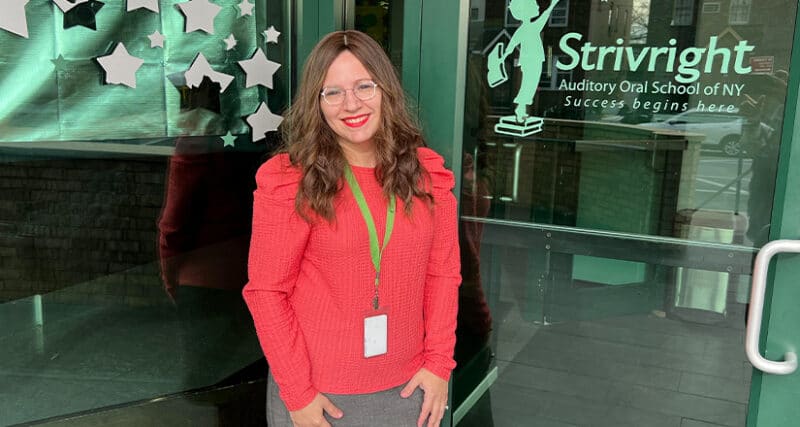Teacher Stories: Miriam Schatzkamer – Speech Pathologist at Strivright / Auditory Oral School of New York
“I have one brother, six years older than I, and we’re actually from Ukraine. Back in the Ukraine he had a speech pathologist working with him, but they didn’t do a very good job and he still has some speech issues to this day. But seeing him struggle with his speech led me to consider taking some speech classes and see how I enjoyed that. The first class I took, I was hooked.
“Strivright is a school for children who have hearing loss or other speech and language delays. When working with children with hearing loss, there are different approaches one can use. Some can use sign language as one way but in our school we use a listening and spoken language approach. We teach our children to listen and to speak, as opposed to signing. All of the children in our school will have hearing loss listening devices, so they’ll have either hearing aids or cochlear implants, and they utilize those to help them hear. Our goal is for all our children to be mainstreamed. So, when they’re in third grade, and the teacher says, ‘Johnny, please go get your math book and open it to page 234,’ they won’t have to rely on watching the teacher. They will be able to use their listening alone to be able to follow that just like other children.
“I have so many success stories I can share. Working with children who come to our program, they don’t have one word that they can say, and watching them say their first word and their parents’ eyes just light up. Here was their child who was born deaf. They were told in the hospital that their child did not pass the newborn hearing screening. And then, further testing said your child is deaf. Your child cannot hear. You know, we have this one parent who pictured her child as being that person on the subway with a sign that says, ‘Please give me money,’ because she knew nothing about people who are deaf. She just thought her child will never be able to communicate and will never be able to get a job. So, when that child graduated at five years old, and was able to go to a local mainstream elementary school, and was able to communicate beautifully, that was incredible to witness, you know. We have so many stories such as these children; I am blessed to be able to wake up and say, I am so excited to go to work today. And how many people can say that every single morning?
In the case of my brother, he didn’t have any hearing concerns. For him, it was just the pronunciation of the sounds that he wasn’t able to produce so clearly. So his speech sounded kind of like it was a little bit mumbled. He wasn’t really able to open his mouth. It kind of made me wonder about his situation. I heard my parents saying to him, ‘Speak a little clearer, open your mouth a little more,’ and I kind of felt a little bad for him. You know, it wasn’t his fault that he was speaking the way he was speaking. It always made me wonder, what could have been done differently when he was 2, 3, 4 years old? Could something have been done differently so that he could speak more clearly? I mean, don’t get me wrong: he’s doing well for himself. Now he has his own family, he has four children, and he’s in computer programming. But to this day, his speech is not so clear. But he is doing very well for himself.
Interview by Gregory Andrus, Portraits of the Jersey Shore www.portraitsofthejerseyshore.com





